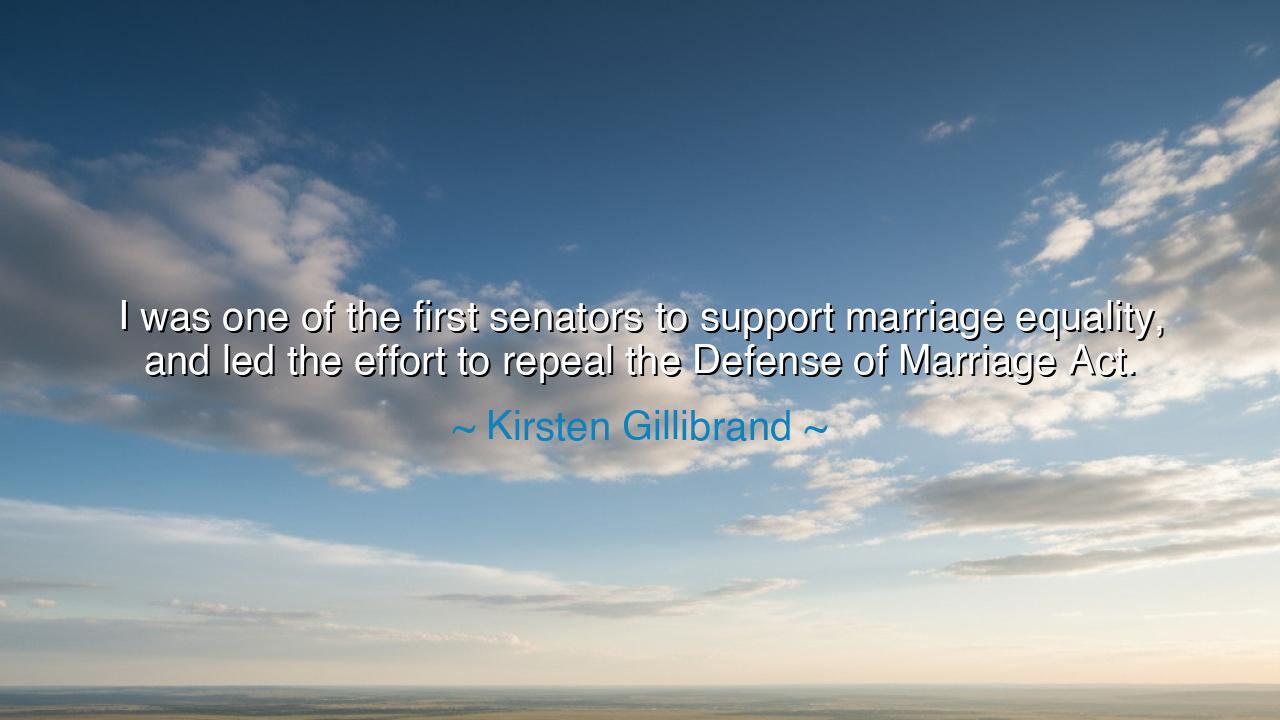
I was one of the first senators to support marriage equality, and
I was one of the first senators to support marriage equality, and led the effort to repeal the Defense of Marriage Act.






In the heart of justice, there lies a conviction that truth must always guide the course of human law. The words of Kirsten Gillibrand—"I was one of the first senators to support marriage equality, and led the effort to repeal the Defense of Marriage Act"—speak to a courageous journey that defied the prevailing currents of political and social opposition. In these words, we hear the echo of heroes throughout history, those who stood at the frontlines of justice, not out of personal gain, but out of a profound commitment to equality and the freedom of all people, regardless of their identity or love.
Let us look back to the ancient world, where the quest for justice was often seen as the highest calling, whether through the laws of Solon in Athens or the philosophies of Plato. These thinkers understood that the laws of a people must reflect the moral principles of fairness and equality. Yet, as with the fight for marriage equality, the road to justice is often paved with struggle. In the time of Solon, the laws were shaped not just by the rulers, but by the collective will of the people. Gillibrand’s efforts to repeal the Defense of Marriage Act, and her role as one of the first to champion marriage equality, reflected this same commitment to shaping laws that are rooted in justice, rather than prejudice.
Consider the example of Harriet Tubman, whose unwavering courage in the face of oppression led her to free over 70 slaves through the Underground Railroad. Tubman, like Gillibrand, defied the status quo of her time, standing firm in the belief that freedom is not just a privilege for the few, but a right for all. The courage to stand for justice, even when it is not the popular stance, is a rare and powerful thing. Tubman’s leadership in the abolitionist movement did not come without personal cost, but her commitment to freedom was greater than the fear of retaliation. In the same way, Gillibrand stood firm for marriage equality, even when many of her colleagues in the Senate resisted change, because she knew that love should never be confined by the bounds of arbitrary laws.
The Defense of Marriage Act (DOMA), enacted in 1996, defined marriage as the union between a man and a woman, effectively denying legal recognition and protections to same-sex couples. For years, this law perpetuated the injustice of inequality, refusing to acknowledge the dignity and rights of same-sex couples who sought the same legal recognition of their love. But Gillibrand, with the foresight of a true leader, recognized that DOMA was not just a piece of legislation; it was a barrier to the freedom and human dignity of a people. Her efforts to repeal this law were not merely about changing the law, but about changing the very fabric of society, moving towards a world where equality and love could no longer be denied.
The fight for marriage equality is a powerful reflection of the human desire to live in a world where love, not fear, governs our lives. Gillibrand’s role in this fight parallels the many social justice movements throughout history. Consider the women's suffrage movement, where leaders like Susan B. Anthony and Elizabeth Cady Stanton stood firm for the right of women to vote. Just as these women faced fierce opposition from a society built on patriarchy, those who stood for marriage equality faced their own battles against ingrained prejudices. The repeal of DOMA was a victory not just for same-sex couples, but for the very concept of freedom that is the cornerstone of democratic societies. It was a victory for love, human dignity, and the recognition of equal rights for all citizens.
The lesson we take from Gillibrand’s words is clear and powerful: change does not come without effort, but it is effort rooted in conviction and moral courage that shapes the future. Marriage equality was not a change that simply happened because it was “time”; it was a change fought for by those who believed, as Gillibrand did, that love knows no boundaries and that justice must be for all people, regardless of their gender or sexuality. The struggle for justice is never easy, but it is through the persistent efforts of those who stand for what is right, despite the opposition, that true change occurs.
In your own life, reflect on the importance of standing up for justice, especially when it is not the easy or popular choice. Gillibrand did not seek the path of least resistance; instead, she chose to fight for a future where love, freedom, and equality were available to all. Ask yourself where you can bring your own efforts into the fight for justice, whether it be in standing up for human rights, fighting against discrimination, or simply supporting those who cannot always stand up for themselves. The lesson is simple: change is the work of the brave, and those who push for a better world will leave a legacy that shapes generations to come.






AAdministratorAdministrator
Welcome, honored guests. Please leave a comment, we will respond soon